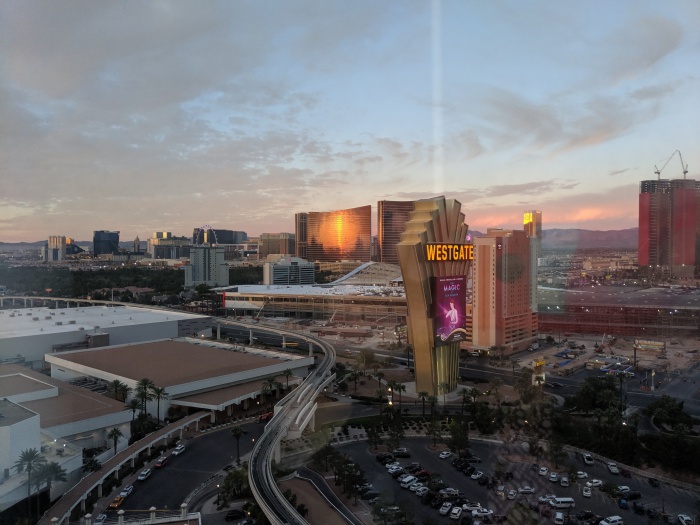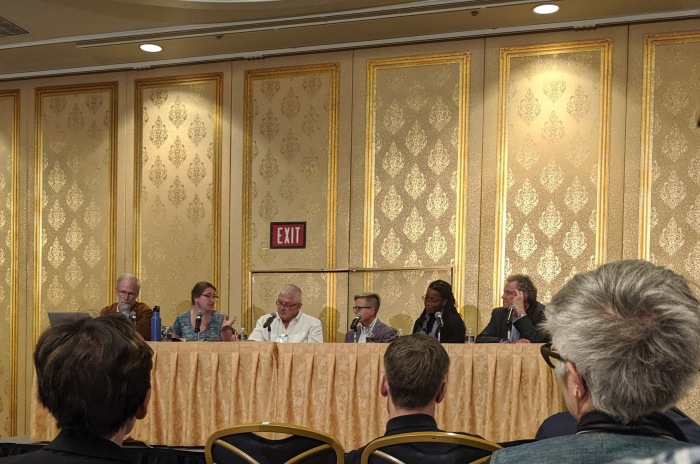
Photo of the conference hotel by Anna Kramer.
Erstwhile contributing editors Kerri Clement and Anna Kramer write about their experiences at the 59th annual conference of the Western History Association, which occurred in Las Vegas, Nevada from October 16-19, 2019. This year’s conference theme, “What Happens in the West Doesn’t Stay in the West,” played on the catchphrase of the host city—“What happens in Vegas, stays in Vegas”—and encouraged attendees to examine the connections between western history and the histories of other regions and to think expansively about the field as well as critically about the role of regionalism in historical study.
Reasons for Attending
Kerri: Stepping off the plane Wednesday night was a surreal and contradictory experience. The pungent cigarette smoke, bright lights, and raucous sounds of the slot machines put me on edge. Yet, I was excited to get to the conference because for me, the WHA has been a sort of “intellectual home.” I first attended in Portland several years ago as a wide-eyed master’s student, intending to get a sense of the field as I was deciding whether or not I wanted to pursue a Ph.D. program. In Portland, I met many kind and inspiring scholars who gave me extensive guidance about academia, Ph.D. applications, and the field of western history in general. The only downside to that conference was I got lost on my way to Powell’s bookstore. Since then, I’ve attended several WHA meetings, including one due to the generosity of the WHA graduate award group, and I have since presented several papers. I’ve gained phenomenal feedback on my work and scholars of all ranks have inspired me with their presentations to rethink my own work.
But perhaps the most significant benefit I have gained by attending the WHA these last several years are the relationships I’ve formed with scholars all over the country. Attending the WHA now feels like an extended family reunion, one where my geeking out over historical topics or beginning sentences with “did you know that…” won’t solicit a sigh and a glance at a watch. These relationships have led to the creation of panels at other conferences, changes in my research direction, and mentorship concerning my academic career, saying nothing of the wonderful friendships stemming from WHA meetings. I wanted to attend the Las Vegas conference to reunite with good friends and so joined a panel proposal titled “The Cowboy Life.” After we learned of our acceptance, I eagerly looked forward to a proverbial “family reunion.”
Anna: As a second-year PhD student still in coursework and narrowing down my precise research interests, I was not originally planning on attending this year’s Western History Association conference in Las Vegas. In fact, it wasn’t even on my radar until this past June, when I met Michael Childers, an environmental historian of the modern American West at Colorado State University, who strongly encouraged me to attend even though I would not be presenting. Given the particularly grim outlook of the academic job market, he said it was important that I start attending these conferences and become a recognizable face in the community. My advisor, Paul Sutter, echoed these arguments, and so, with barely a month to go before the conference, I registered and bought my plane tickets for the short hop over the Rockies to Vegas in mid-October.
I felt like more than a bit of an imposter as I arrived in the southern Nevada desert. I wasn’t presenting a paper and I had only a few meetings scheduled with friends and mentors. While the places I study are generally located in the western United States, I don’t necessarily think of myself as a western historian. As an environmental historian, I am drawn to studying the landscapes around me, and since I have lived in California and Colorado for the past seven years, those landscapes just happen to be in the American West. In addition, as a young graduate student, I felt particularly intimidated by the many accomplished scholars in attendance and the more senior graduate students who were busy presenting papers, having meetings about the job market and publishing, and who, in general, looked like they knew what they were doing. But I decided that I would make the most of attending panels, meeting people, and learning about this particular community of historians.
Panel Highlights
Kerri: One of the panels I enjoyed the most was “Responding to Decline and Extinction: Connections in Western Wildlife History,” with papers that concentrated on extinction and revival history of various fish and whale species in the American West. I was struck with how the papers all spoke to various power relationships between state and other governmental agencies that hinged on arctic grayling, suckerfish in Oregon, or Gray Whales. In other words, animals’ historical agency can change governmental policy. These papers reminded me to think about how governments and other humans cooperate (or not) together in response to animals’ decline or revival.
I quite enjoyed presenting as a member of the “The Cowboy Life” panel, thanks to the organizing efforts on the part of Tracey Henshaw. Our papers ranged from appropriation of cowboy fashion, to the development of the pinup cowgirl, to farm women in rural Canada, to English reactions to American rodeo, to a digital history project about Montana cattle (that’s me). After attending several WHA conferences, I always marvel at others’ scholarship, as well as the behind-the-scenes organizing it takes to corral panelists, submit proposals, and then show up to present! Although this year I was exceptionally nervous as I have never presented on a digital history project before, I thoroughly enjoyed the audience’s feedback and questions and look forward to incorporating it into the project.
Anna: I kicked off the conference sessions by attending an incredible Thursday morning panel titled “What Happens on Western Land is Never Just Western: American Opportunity, Federal Policy, and Agrarian Whiteness.” The discussion centered on the varied and changing understandings and forms of whiteness in the West, from Oklahoma to California to the border, and concluded with a pointed and important critique by Mary Mendoza that environmental historians “still have a [Frederick Jackson] Turner problem,” and that we environmental historians have yet to deconstruct the nature of whiteness that is implicit in Turner’s frontier thesis and to disentangle the relationship between whiteness and wilderness.
I was impressed and delighted by the number of panels discussing indigenous history in a variety of ways. I learned a great deal about indigenous resistance, history, and politics from a panel responding to Nick Estes’ Our History Is the Future: Standing Rock Versus the Dakota Access Pipeline, and the Long Tradition of Indigenous Resistance (2019) and about race, natural history, the U.S. Army, and indigeneity during a panel titled “Natural Soldiers” on Saturday. Another Saturday panel, in which Erstwhile founding editor Alessandra Link participated, discussed how the recent “Railroads in Native America” symposium in Omaha, Nebraska in September brought together indigenous and non-indigenous scholars, the Union Pacific Railroad, the National Park Service, and more for a “counter commemoration” of the 150th anniversary of the transcontinental railroad.

Photo of Erstwhile founding member Alessandra Link. Taken by Anna Kramer.
Major Events and Receptions
Kerri: I’ll try to highlight some of the breakfasts and lunches—one of my favorite parts of the conference. The CWWH (Coalition for Western Women’s History) breakfast has been a highlight of my WHA experience ever since a faculty member insisted I attend several years ago. The celebration of women’s, gender, and sexuality history paired engaging conversation (even at 7 am and with rapidly-disappearing coffee) with the centering of critical new work provides an unmatched space for the encouragement and growth of western history. Another event I look forward to every WHA is the Indian Scholars Lunch on the last day of the conference. This event brings together Indigenous scholars and scholars studying Indigenous history and honors the work they do in service to Indigenous scholarship and history. This year, the event honored the renowned work of Jeffrey Ostler and his recent book Surviving Genocide. The lunch was a highlight of my WHA and I’m quite excited for WHA 2020 in Albuquerque to reconnect with my western history family.

Photo of the plenary session by Anna Kramer.
Anna: For the Western History Association to have a presidential plenary questioning the continued relevance of the very region that its members study was an interesting choice, but I enjoyed the conversation that took place during the plenary titled, “Does the West Matter?: The Future of Regionalism in American History.” The roundtable was replete with the heavyweights of not just Western history, but of U.S. history as a whole: William Cronon chaired, with Edward Ayers, Lisa Brooks, Susan Lee Johnson, Tiya Miles, and George Sánchez serving as panelists. The consensus from these scholars, three of whom primarily study regions outside of the American West, was resoundingly that regions definitely still matter, even though, as Tiya Miles so eloquently said, “regional boundaries have always been provisional, political, and porous.” Although regions are constantly made and remade, they play an important role in the meanings people give to their lives, and that alone, these scholars seemed to agree, made regions and regional identities worth studying. Some reference to previous debates in Western history—was the West a place or a process?—were brought up, but by and large, the panelists seemed to be in accord about the importance of studying the West while recognizing the importance of place, migration, and the ever-changing relations between regions and the nation-state as a whole.
I attended a few of the organized social receptions and events, including the American Society for Environmental History breakfast, the Graduate Student Reception on Thursday, and the Friday evening reception organized by the Committee on Race and the American West (CRAW) and the Coalition for Western Women’s History (CWWH). At these events and across the conference, I was delighted to meet fellow grad students and scholars who I know from the #twitterstorians community, as well as others I have met in person over the course of my undergraduate and graduate studies. As a relatively new graduate student, it was intimidating to realize that you’re standing in the food or drinks line with a senior scholar you admire, but I found my fellow conference attendees to be generally quite kind and excited to chat with a young historian. I am looking forward to attending future WHA conferences and being a part of this dynamic and welcoming community.


